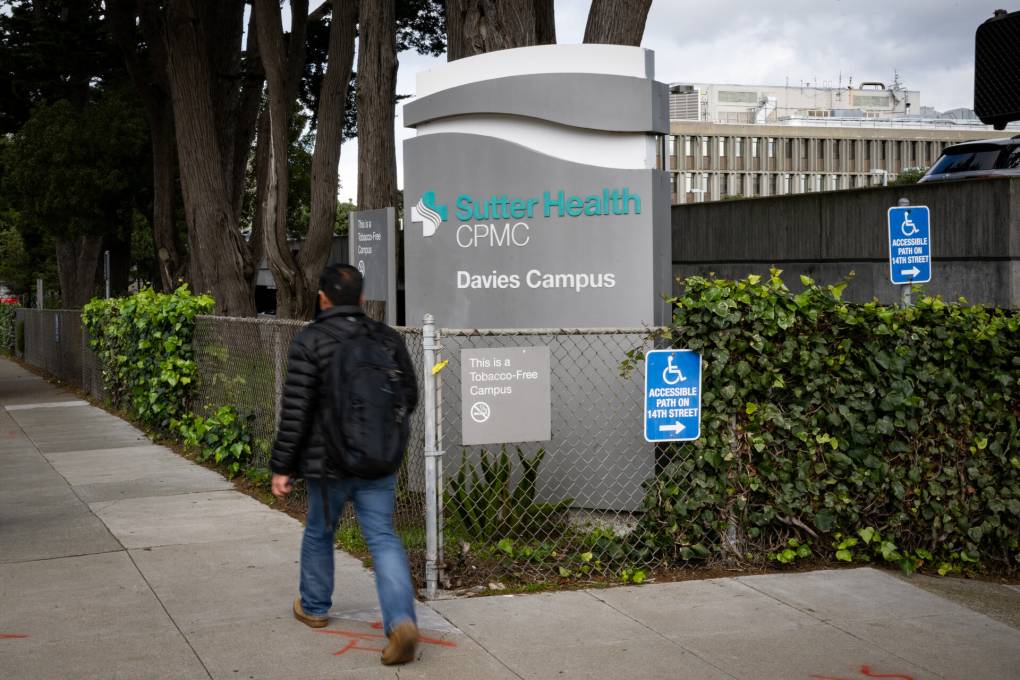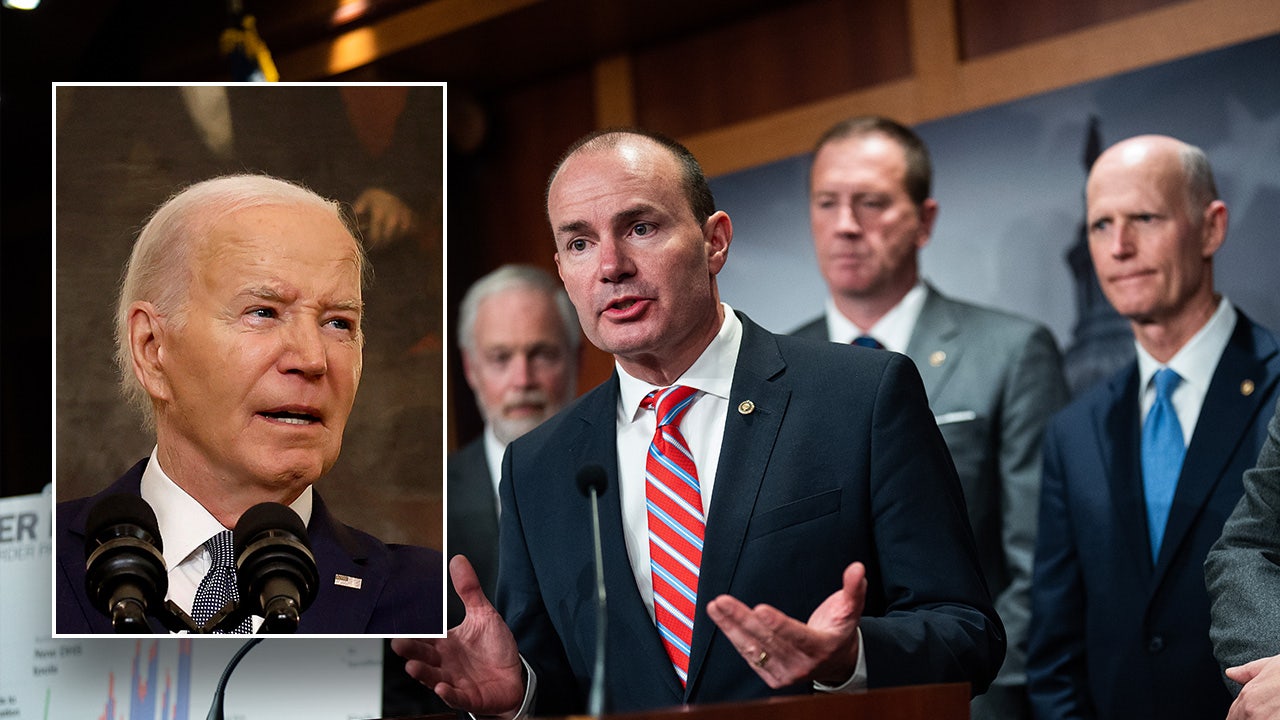California
‘Defenseless’ California ice cream man trying to raise money for autistic son robbed for 3rd time in 1 week

An elderly local vendor who sold ice cream to help support his family and pay rent was robbed at gunpoint in California for the third time in a week.
Don Juan, 82, was selling ice cream around noon Monday in Oakland when two armed thieves jump out the backseat of a black Ford Edge and stripped the man for all he had, Citizen app footage showed.
Another man briefly stepped out of the passenger-side seat as the thieves took off with $120, according to NBC Bay Area.
The disturbing encounter is the third time in one week Juan was mugged as he pushed his ice cream cart around.
Juan told the outlet this was also the eighth time in 10 years he’s been robbed while doing all he can to raise money for his autistic son in Peru.
Oakland police are still investigating but have no suspects in custody as of Wednesday.


A GoFundMe page has been created for Juan to help recover the funds he lost in the scary ordeal.
More than $13,670 has been raised for Juan — surpassing the $5,000 mark that was initially listed on the site.
“Don Juan has informed us that he is unable to pay his rent this month, amongst his other living expenses,” the page said. “As a defenseless man, he is left with no choice but to withstand this behavior from these criminals and keep it pushing day by day to make a living.”
A handful of Oakland organizations as well as street vendor activist Alex Enamorado have already opened their arms to the elderly man, with the community already having put together a buyout of his ice cream.
“This is definitely wrong on so many levels. #ProtectStreetVendors,” Enamorado said on Instagram.
Incidents of vendors being robbed at gunpoint in California have been on the rise.
Two armed robbers held up a pair of taco stands in Los Angeles, which left two people injured during the shootout in June.
A week prior to that, LAPD officials said three incidents on May 28 involving two different groups held up taco trucks from about 11 p.m. to 12:25 a.m.
They said the thieves made off with around $1,800 from the two hauls.

California
Assault on Psych Doctor Spurs Call for California Health System to Boost Safety | KQED

Board of Supervisors President Aaron Peskin, who co-sponsored the legislation, told KQED in a statement that the city is moving aggressively to staff up its essential health care workers. “But we won’t be able to expand our workforce if the health care system isn’t safe,” he said. “Health care workers who keep us safe and healthy deserve safety in their workplace, too.”
He added “That starts with OSHA enforcement of reporting and tracking of assaults within our hospital network. Transparency and accountability are key.”
Golomb, for her part, told KQED that she felt heartened to know about the supervisors’ resolution.
“We’re simply asking for respect and dignity from [Sutter Health], and we haven’t really seen that,” she said. “We’ve been negotiating for our contract for months now, and they continuously refuse to put language in the contract about 24/7 security on our inpatient psych unit.”
Sutter Health did not immediately respond to a request for comment on Monday.
Golomb and about 15 of her resident colleagues announced in January their plans to unionize and have been negotiating a first contract with the hospital system.
They have asked CPMC to increase its safety measures, pressing for a round-the-clock security presence in the inpatient psych unit and an intensive care unit.
Sutter Health has said it is committed to a fair contract and safe work environments.
The hospital said it has spent nearly $40 million to improve security for the unit where Golomb was attacked, purchasing cameras, panic buttons and duress alarms, and securing doors. A security officer is now stationed there during the day.
California
California-mandated ethnic studies sparks curriculum clash

California’s public schools will be required to offer a full-year course in ethnic studies beginning in the 2025-26 school year. And by 2030, students won’t be able to graduate without it.
But school districts, including some in the Bay Area, are caught up in a curriculum crossfire that’s landed some in hot water — and court.
Ethnic studies examines the history of race and ethnicity in the United States, with an emphasis on the experiences of people of color. But as public schools face heightened tensions stemming from the Israel-Hamas war, the clock is ticking for educational leaders to address how to teach the state’s new mandate — especially when it comes to Israel, Palestine and the ongoing conflict.
The state took five years and four drafts to approve an ethnic studies “model curriculum” for schools to follow. But districts are not required to implement it as long as their curriculums don’t reflect or promote bias, discrimination or religious doctrine.
There are two competing visions of ethnic studies at the heart of the conflict: critical or “liberated” ethnic studies — often taught at universities — and “constructive” ethnic studies, which the state’s model now closely resembles.
The key difference between the two courses comes down to politics, said Elina Kaplan, co-founder of the Alliance for Constructive Ethnic Studies, an advocacy group pushing for schools to implement constructive ethnic studies.
The liberated model “focuses on power structures, repression, imperialism, colonization,” Kaplan said. “Everything else is what we would call constructive ethnic studies. Think of it as the depoliticized version of ethnic studies.”
When the state unveiled the first draft of its curriculum in 2019, the material was largely criticized for being antisemitic, loaded with politically correct jargon and not inclusive enough about the histories of Jewish, Armenian, Sikh and other communities.
“It was very clear that it did not represent all of the communities that needed to be included,” said Marc Levine, a former state Assembly member and the Central Pacific regional director for the Anti-Defamation League. “In fact, it had discriminatory language specifically about Jews and Israel.”
The draft received over 20,000 public comments, most of which objected to the omission of Jewish Americans and antisemitism, while Israeli persecution of Palestinians was highlighted. The 2019 draft also included sample topics focusing on strikes and protests for Palestine and calling for the boycott, divestment and sanctions of Israel.
One source material included a song by Ana Tijouz and Shadia Mansour, with the lyric, “for every free political prisoner, an Israeli colony is expanded.”
Gov. Gavin Newsom described the curriculum as “insufficiently balanced and inclusive” and said the draft needed to be substantially amended.
In 2021, he approved a bill that revised the model ethnic studies curriculum and removed content Jewish groups found harmful. Palestine isn’t mentioned once in the finalized 700-page curriculum model or 30 sample lessons, although lessons on the Holocaust, antisemitism and Jewish American identity are included.
The original course was designed by a group of 19 ethnic studies experts who were selected by the California Department of Education. After the state revamped the curriculum, some members of the group joined with other educators and activists to develop and implement their own course, the Liberated Ethnic Studies Model Curriculum Coalition.
The group did not respond to The Bay Area News Group’s request for comment, but in a statement on its website said that the ethnic studies model curriculum that the state Board of Education approved in March 2021 “bears so little relation to the original draft” that every member of the advisory council “demanded that their name be removed.”
The coalition complained that the state’s new curriculum “sanitizes” the course by removing or redefining terms like capitalism and revolution, erases all mention of Palestine and fails to depict the impact of the Black Lives Matter movement and the true causes of police brutality.
But the liberated coalition’s model also has been widely criticized as antisemitic.
StandWithUs, an international nonprofit promoting Israel education, said the coalition was trying to “exploit” the state’s new requirement as a “platform for antisemitism, anti-Israel propaganda and other forms of bias.” The Foundation Against Intolerance and Racism said the model’s promotion of a specific political view violates the California Constitution and Education Code.
Several California school districts are already facing lawsuits over material some find objectionable.
The Deborah Project, a law firm advocating Jewish civil rights, has sued Mountain View-Los Altos Union High School District and Hayward Unified High School District, citing “overtly” antisemitic teaching materials.
The firm has also sued the coalition for pushing antisemitic and anti-Zionest materials in Los Angeles public schools.
Sequoia Union High School District, Morgan Hill Unified School District and Berkeley Unified School District are also facing backlash from community members for their ties to the liberated coalition’s model.
While both course models focus on four areas — Black studies, Asian American and Pacific Islander studies, Chicanx/Latinx studies and Native American studies — Liberated’s material largely excludes the histories of ethnic groups who may be considered White.
The Liberated Coalition explained that its course material does not include European-American ethnic groups, including Jews, because while those groups have faced discrimination, “their experiences differ from the contemporary and historical experiences of radicalized communities in the U.S., especially their experiences with racism and colonialism.”
Liberated also focuses heavily on activism in its student assignments. For one lesson on redlining and U.S. housing discrimination, the course has students write a persuasive letter to county leaders calling for reparations.
The group responded to criticism of its course saying that students are aware of their surroundings — including racism and injustice — from a very young age.
“Ethnic studies doesn’t tell students what to think, but it is a framework for understanding their reality,” the group said.
But co-founder of the Alliance for Constructive Ethnic Studies, Kaplan, said the model stands to do more harm than good in the long run.
“Ethnic studies is good and it’s healthy and it’s the right thing for our students to be learning,” Kaplan said. “They should just be learning it in the way that the legislators intended, which is in this positive empowering way to learn about each other and to confront racism and discrimination.”
California
Disney employee dies of head trauma after nasty fall in Anaheim, California

An employee at the Disney Resorts in Anaheim, Calif., has died of head trauma days after falling off a moving golf cart in a backstage area.
Bonnye Mavis Lear, 60, of Fullerton, died Friday, two days after the cart she was a passenger in hit a bump or dip in the road as it went about 20 miles per hour.
Lear tried to grab a handrail but “it gave way and sent her out of the vehicle,” wrote colleague Rae Delgado on Facebook, according to The Orange County Register. Lear hit her head and fractured her skull, which led to brain swelling, Delgado said.
Lear worked at Disney for 24 years and was most recently an administrator supporting membership services at the resort’s Club 33 in New Orleans Square.
Anaheim police and other first responders were summoned just before 11:30 a.m. Wednesday about a backstage collision, Anaheim Police Sgt. Jon McClintock told the Daily News in an email.
“Upon arrival, police & fire personnel discovered a woman, a Disneyland employee, fell from a moving golf cart and struck her head,” McClintock said. “The woman was transported to a local hospital in grave condition. Tragically, on Friday, June 7, the woman succumbed to her injuries.”
The cart driver was not injured and no drugs or alcohol were involved, TMZ reported.
The Anaheim Police Department is investigating the accident and Lear’s death. Disney expressed sorrow but did not comment beyond that.
“We are heartbroken by the loss of Bonnye and offer our sincere condolences to everyone who cared for her,” Disneyland Resort president Ken Potrock said in a statement to local media. “At this time, we are focused on supporting her family and our cast members through this tragic event and making sure they have the resources they need.”
With News Wire Services
-

 Movie Reviews1 week ago
Movie Reviews1 week ago'Gangs of Godavari' movie review: Much bravado about nothing
-

 Politics1 week ago
Politics1 week agoTrump turns conviction into cash, spotlights record fundraising in wake of guilty verdict
-

 World1 week ago
World1 week agoEl Salvador’s President Nayib Bukele cements power as he begins second term
-

 Politics1 week ago
Politics1 week agoTales from The Trail: Trump 'unleashed' with criminal trial over
-

 Politics1 week ago
Politics1 week agoBiden urges respect for legal system after Trump conviction while publicly flouting SCOTUS rulings
-
News1 week ago
31-year-old man shot to death in Birmingham’s Tom Brown Village
-

 World1 week ago
World1 week agoWildfire season is upon us: Here's what the EU is putting in place
-

 Politics7 days ago
Politics7 days ago5 things to know about Hunter Biden trial









/cdn.vox-cdn.com/uploads/chorus_asset/file/25485897/Google_TV_Free_channels_TV.jpg)










